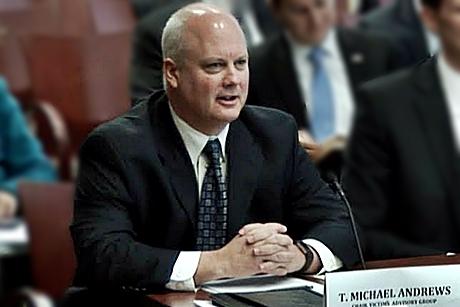Mike Andrews '97 Nominated to U.S. Court of Federal Claims
President Trump’s nomination of RWU Law alumnus follows two state judicial nominations of alumni by Rhode Island governor last week.

Last week, President Donald J. Trump nominated Terrence M. Andrews ’97 – better known as “Mike” to his classmates at Roger Williams University School of Law and most of his colleagues today – to serve as a judge on the United States Court of Federal Claims.
Originally from California but a resident of Virginia for many years, Andrews currently serves as Staff Director and Chief Counsel to the United States Senate Committee on Indian Affairs, which studies the unique problems of American Indian and Alaska Native peoples, including education, economic development, land management, trust responsibilities, health care, and claims against the United States. He is also Chairman of the Victim Advisory Group for the United States Sentencing Commission.
Prior to assuming his duties on Capitol Hill, Andrews served at the Department of Homeland Security, the Department of Justice and as General Counsel and Chief Prosecutor for the Pascua Yaqui Indian Tribe in Tucson, Ariz.
“When I when I was out in Arizona, we litigated [tribal land claim issues] in the Court of Federal Claims,” Andrews said. “Fast forward to when I was a Deputy Assistant Secretary at the Department of Housing and Urban Development, I defended those actions. So I’ve been on both sides in this court, both as plaintiff’s counsel and assisting our attorneys, government counsel at HUD.”
It was the fall of 1994 when Andrews joined RWU Law’s second graduating class.
“Mike was a great guy,” recalled Professor Emeritus Bruce I. Kogan. “I recall that he and John Ryan [RWU Law dean from 1993 to 1998] really got along.” (Andrews explained that Ryan was a fellow Californian who had been a legal colleague of his father.)
“Everyone at the law school, and particularly those of us who were here in the early years, takes great pride in the success of the members of our first graduating classes,” said Professor Michael Yelnosky, who taught Andrews Civil Procedure during his first year. “Mike has already had quite a successful career, and I congratulate him for doing so despite having me as a teacher.”
Chuckling at Yelnosky’s self-depreciation, Andrews said, “I hate to sound old, but at this point I’ve taught law myself at three other law schools, and man, I can tell you that Rogers Williams was never one of those schools that just goes through the motions. They put you through the grinder. They challenge the hell out of you. And you know, to this day I still quote [retired RWU Professor of Law Edward Eberle] when I talk with colleagues about the Constitution. I tell them, ‘That’s not how Professor Eberle taught me, so you must be wrong!’”
During his final semester at RWU Law in 1997, Andrews participated in the Criminal Defense Clinic under Professor Andrew Horwitz.
“Mike was a pleasure to work with as a law student; he is still fondly remembered around the clinic office for his warmth, outgoing nature, and sense of humor,” Horwitz said. “It’s very exciting to have a graduate of my clinical program go on to such heights of achievement. We’re so proud of his accomplishments.”
Dean Gregory W. Bowman agreed.
“RWU Law alumni like Mike really demonstrate that our law school is on the move,” he said. “We have graduates all across the country doing great things, and we are excited for their success.”
Andrews earned his B.A., magna cum laude, from Morgan State University; his M.A. from Salve Regina University; his J.D. from Roger Williams University School of Law; and his L.L.M. from George Washington University School of Law.
If his nomination is not approved by the end of Trump’s term, Andrews said, “I will probably either be carried over ’til the next Congress or possibly renominated by [President-elect Joe] Biden. I’m in a kind of unusual position where I actually have bipartisan support for my nomination.”
The Court of Federal Claims consists of 16 judges nominated by the President and confirmed by the Senate for a term of 15 years. If confirmed, Andrews would join “an ever larger cohort of RWU alumni who have reached a pinnacle in our profession by becoming judges,” Yelnosky observed.
Just last week, two other RWU alumni were nominated to the judiciary by Rhode Island Governor Gina Raimondo. Central Falls Municipal Judge Elizabeth Ortiz ’10 – who also earned her undergraduate degree at RWU in 2007 – was nominated to the Family Court bench, making Ortiz the first Latina ever nominated to that court. If approved by the Senate, she would fill the lifetime seat left open by retiring Judge John E. McCann III.
The governor also named Superior Court Magistrate Richard Raspallo ’97 as a Superior Court nominee to replace Judge Allen P. Rubine. “I remember Mr. Raspallo,” Andrews said of his erstwhile classmate. “Sharp guy. I obviously wish him all the best with his nomination and getting through. He’d make a great judge.”

